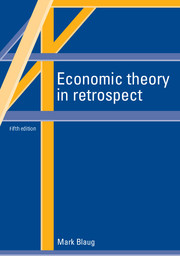Book contents
- Frontmatter
- Dedication
- Contents
- Preface to fifth edition
- Acknowledgements
- Glossary of mathematical symbols
- Abbreviations
- INTRODUCTION HAS ECONOMIC THEORY PROGRESSED?
- 1 PRE-ADAMITE ECONOMICS
- 2 ADAM SMITH
- 3 POPULATION, DIMINISHING RETURNS AND RENT
- 4 RICARDO'S SYSTEM
- 5 SAY'S LAW AND CLASSICAL MONETARY THEORY
- 6 JOHN STUART MILL
- 7 MARXIAN ECONOMICS
- 8 THE MARGINAL REVOLUTION
- 9 MARSHALLIAN ECONOMICS: UTILITY AND DEMAND
- 10 MARSHALLIAN ECONOMICS: COST AND SUPPLY
- 11 MARGINAL PRODUCTIVITY AND FACTOR PRICES
- 12 THE AUSTRIAN THEORY OF CAPITAL AND INTEREST
- 13 GENERAL EQUILIBRIUM AND WELFARE ECONOMICS
- 14 SPATIAL ECONOMICS AND THE CLASSICAL THEORY OF LOCATION
- 15 THE NEO-CLASSICAL THEORY OF MONEY, INTEREST AND PRICES
- 16 MACROECONOMICS
- 17 A METHODOLOGICAL POSTSCRIPT
- Index of names
- Index of subjects
INTRODUCTION HAS ECONOMIC THEORY PROGRESSED?
Published online by Cambridge University Press: 12 September 2018
- Frontmatter
- Dedication
- Contents
- Preface to fifth edition
- Acknowledgements
- Glossary of mathematical symbols
- Abbreviations
- INTRODUCTION HAS ECONOMIC THEORY PROGRESSED?
- 1 PRE-ADAMITE ECONOMICS
- 2 ADAM SMITH
- 3 POPULATION, DIMINISHING RETURNS AND RENT
- 4 RICARDO'S SYSTEM
- 5 SAY'S LAW AND CLASSICAL MONETARY THEORY
- 6 JOHN STUART MILL
- 7 MARXIAN ECONOMICS
- 8 THE MARGINAL REVOLUTION
- 9 MARSHALLIAN ECONOMICS: UTILITY AND DEMAND
- 10 MARSHALLIAN ECONOMICS: COST AND SUPPLY
- 11 MARGINAL PRODUCTIVITY AND FACTOR PRICES
- 12 THE AUSTRIAN THEORY OF CAPITAL AND INTEREST
- 13 GENERAL EQUILIBRIUM AND WELFARE ECONOMICS
- 14 SPATIAL ECONOMICS AND THE CLASSICAL THEORY OF LOCATION
- 15 THE NEO-CLASSICAL THEORY OF MONEY, INTEREST AND PRICES
- 16 MACROECONOMICS
- 17 A METHODOLOGICAL POSTSCRIPT
- Index of names
- Index of subjects
Summary
This is a critical study of the theories of the past: it concentrates on the theoretical analysis of leading economists, neglecting their lives, their own intellectual development, their precursors, and their propagators. Criticism implies standards of judgement, and my standards are those of modern economic theory. This would hardly be worth saying were it not for the fact that some writers on the history of economic thought have held out the prospect of judging past theory in its own terms. Literally speaking, this is an impossible accomplishment for it implies that we can erase from our minds knowledge of modern economics. What they have meant to say, however, is that ideas should be weighed sympathetically in the context of their times, lest the history of economic thought degenerate into a boring exercise in omniscience. The danger of arrogance toward the writers of the past is certainly a real one – but so is ancestor worship. Indeed, there are always two sorts of dangers in evaluating the work of earlier writers: on the one hand, to see only their mistakes and defects without appreciating the limitations both of the analysis they inherited and of the historical circumstances in which they wrote; and, on the other hand, to expand their merits in the eagerness to discover an idea in advance of their own times, and frequently their own intentions. To put it somewhat differently: there is the anthropomorphic sin of judging older writers by the canons of modern theory, but there is also what Samuelson once called ‘the sophisticated-anthropomorphic sin of not recognising the equivalent content in older writers; because they do not use the terminology and symbols of the present’. For an example of the former, take Pigou's reaction when asked to review a work on the Theories of Value before Adam Smith: ‘These antiquarian researches have no great attraction for one who finds it difficult enough to read what is now thought on economic problems, without spending time in studying confessedly inadequate solutions that were offered centuries ago.‘ For an example of the latter, take the opening page of any doctoral dissertation on the works of a neglected forerunner.
- Type
- Chapter
- Information
- Economic Theory in Retrospect , pp. 1 - 9Publisher: Cambridge University PressPrint publication year: 1997



